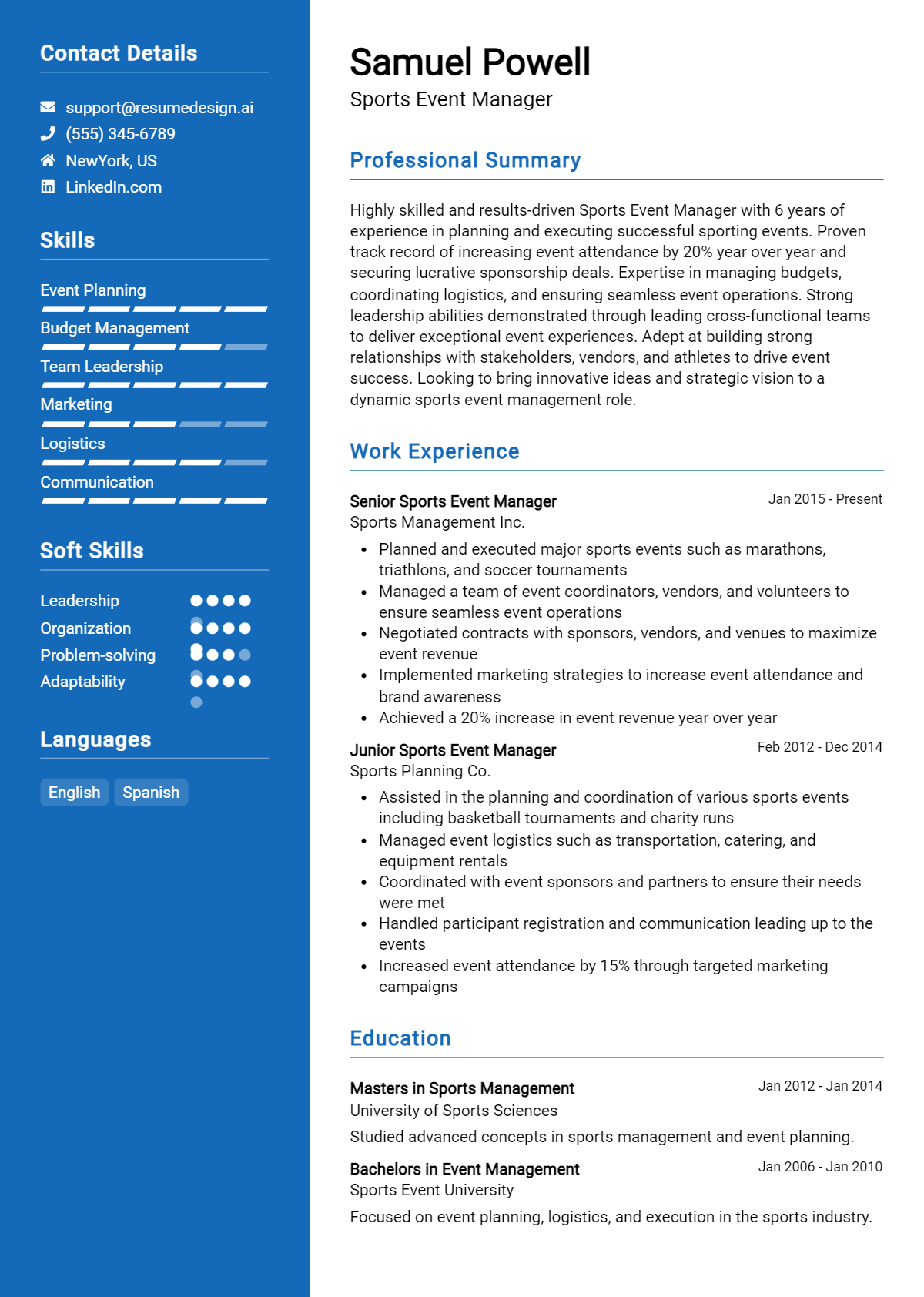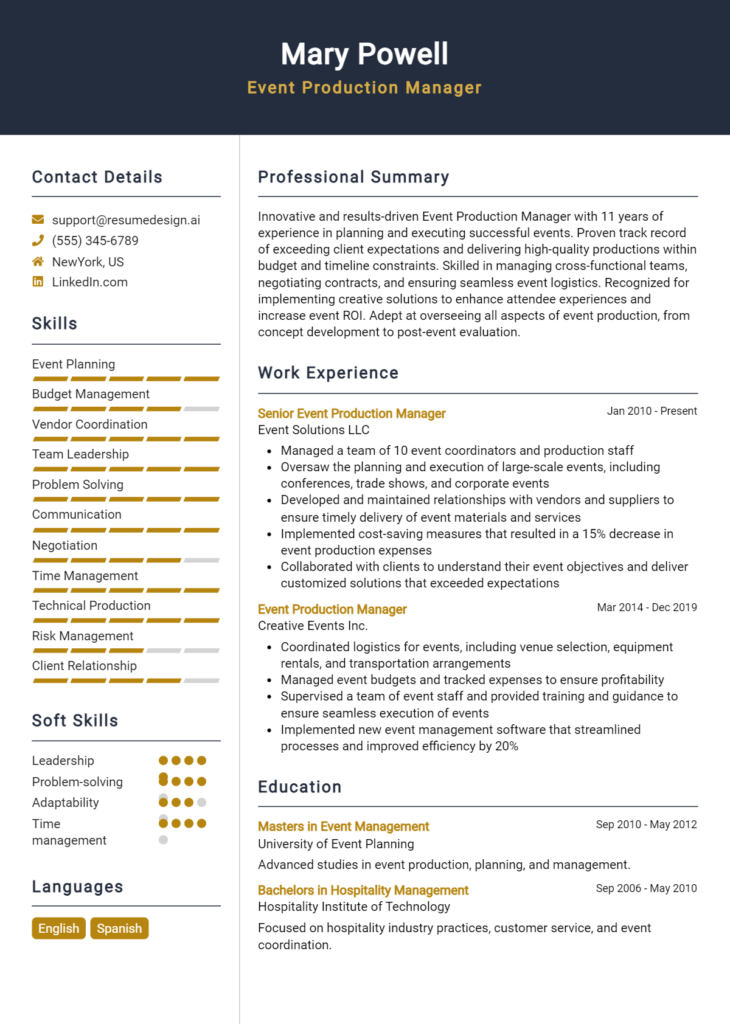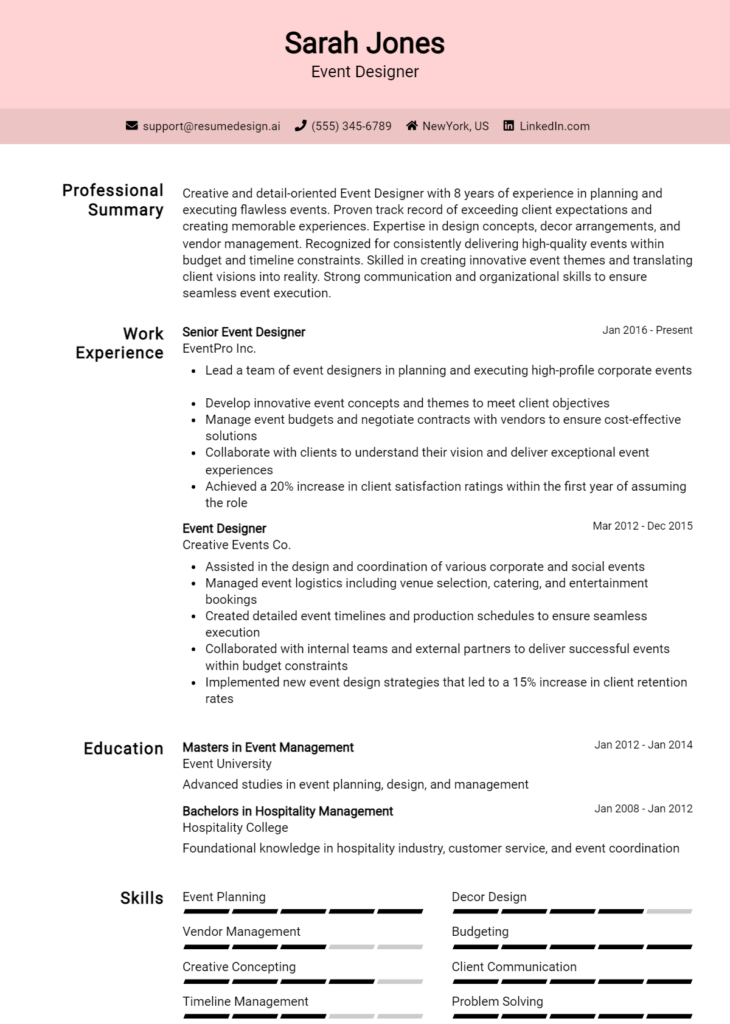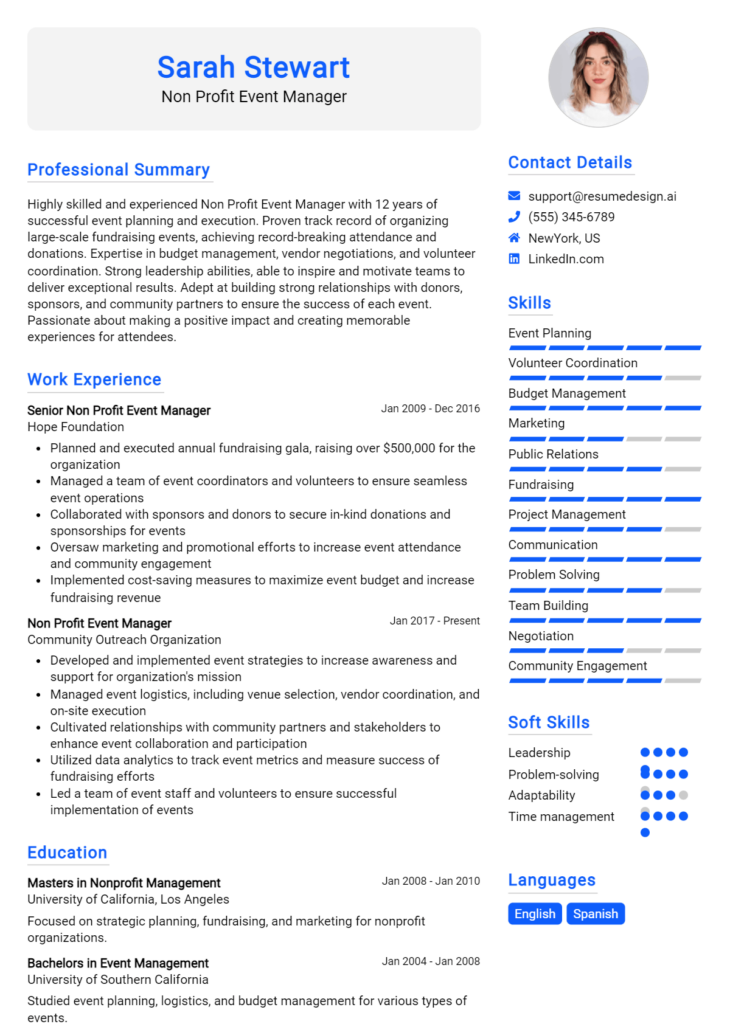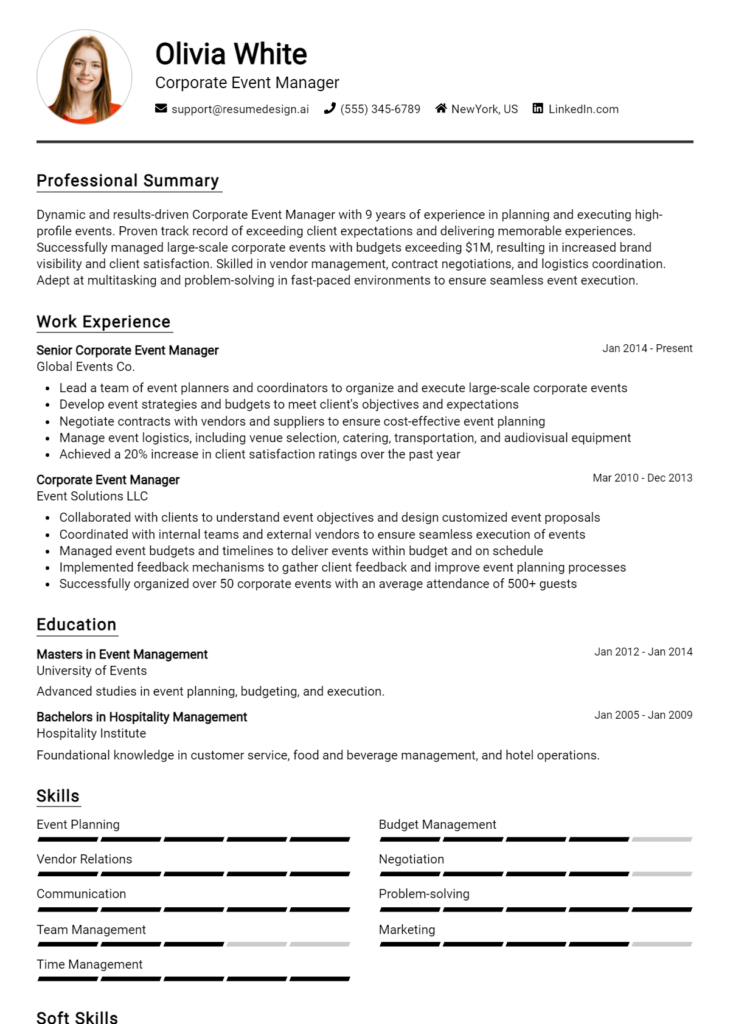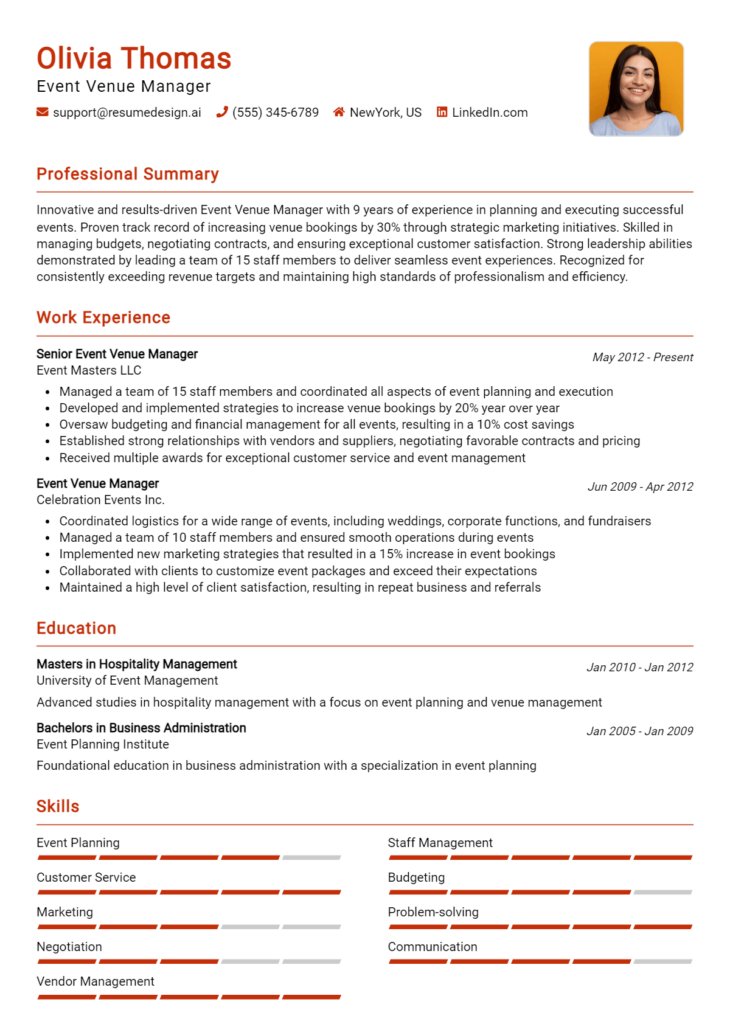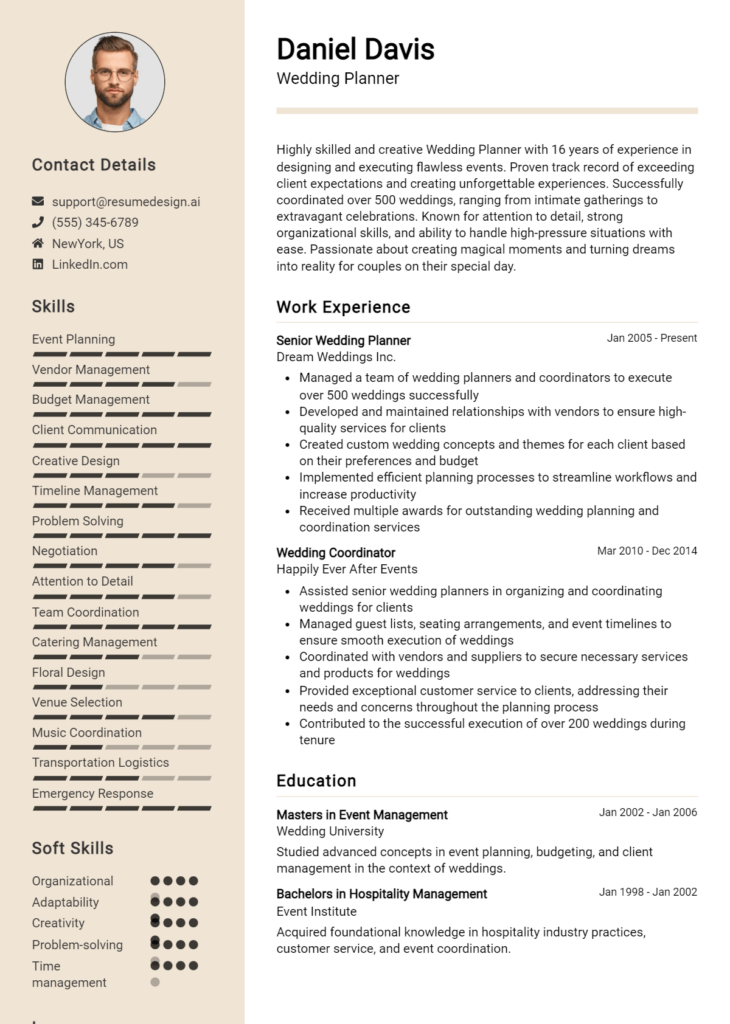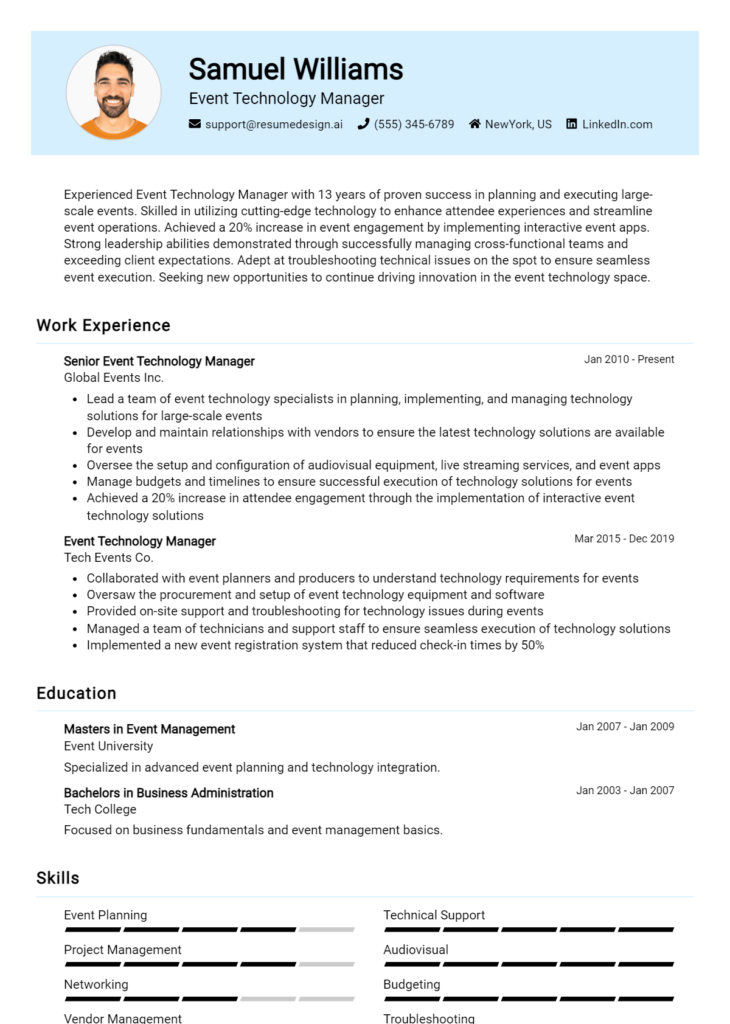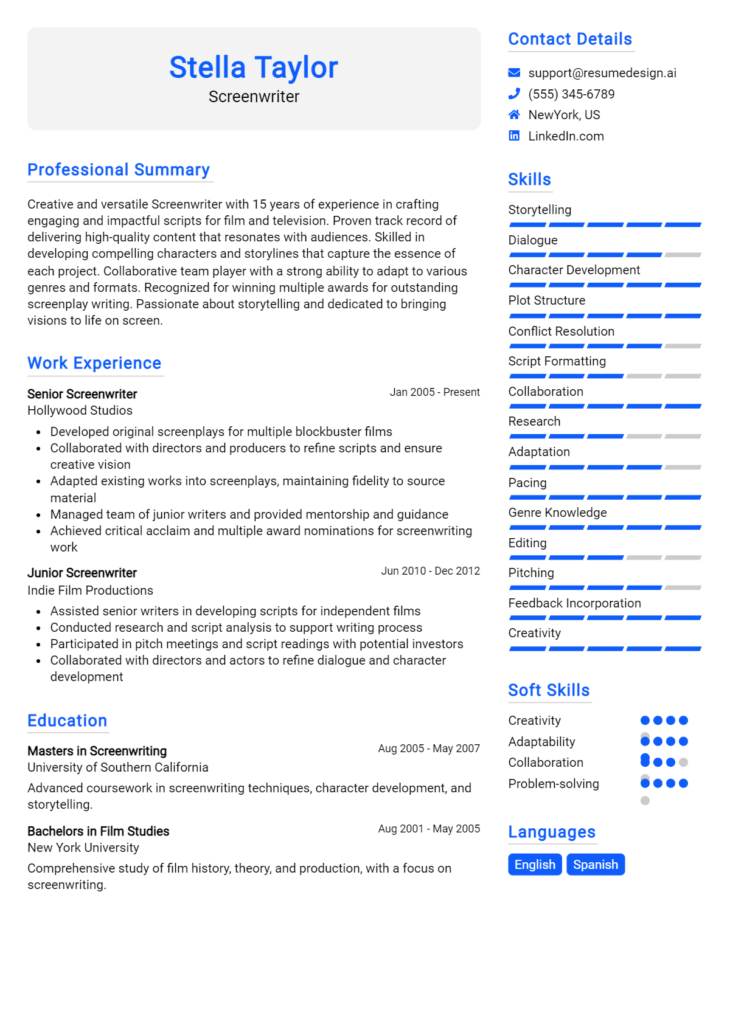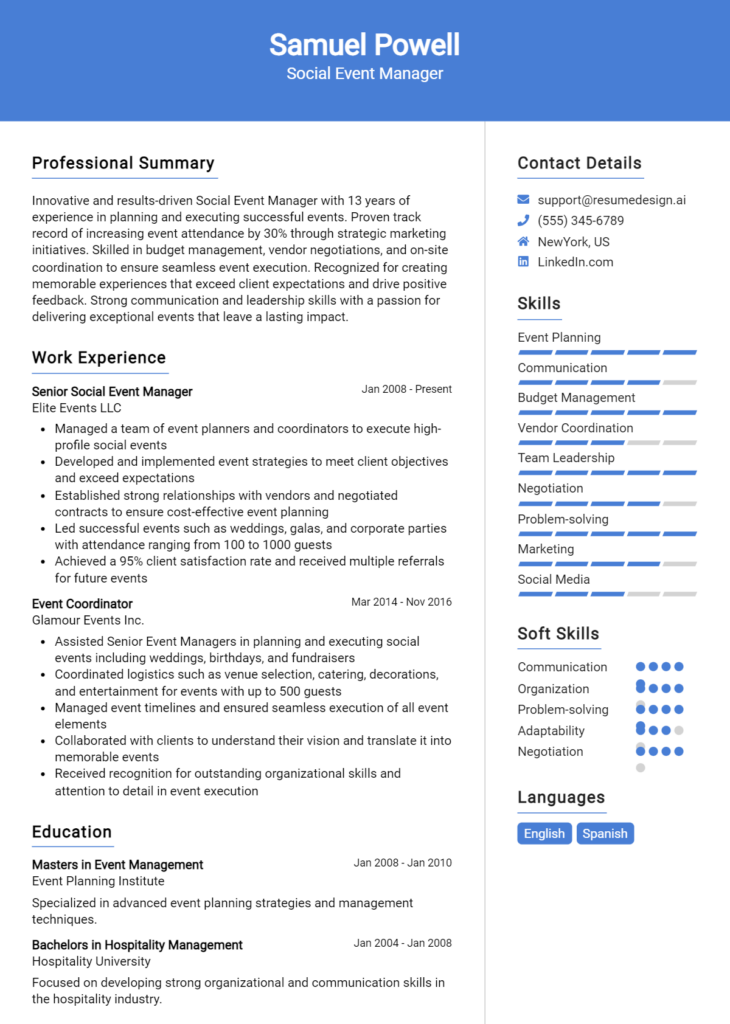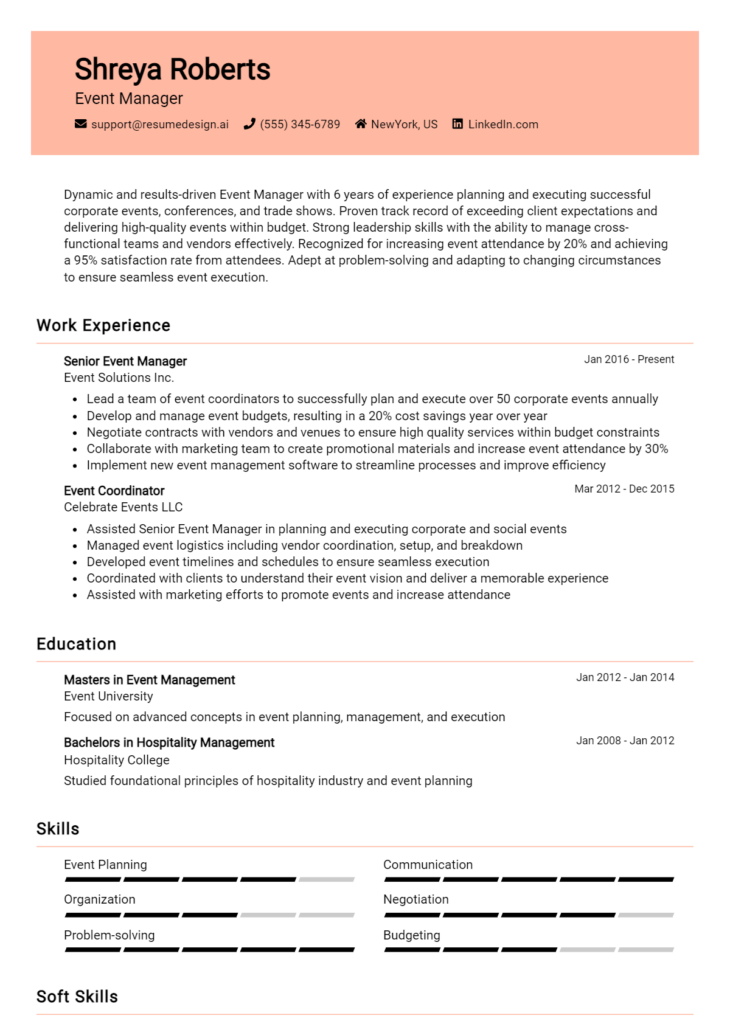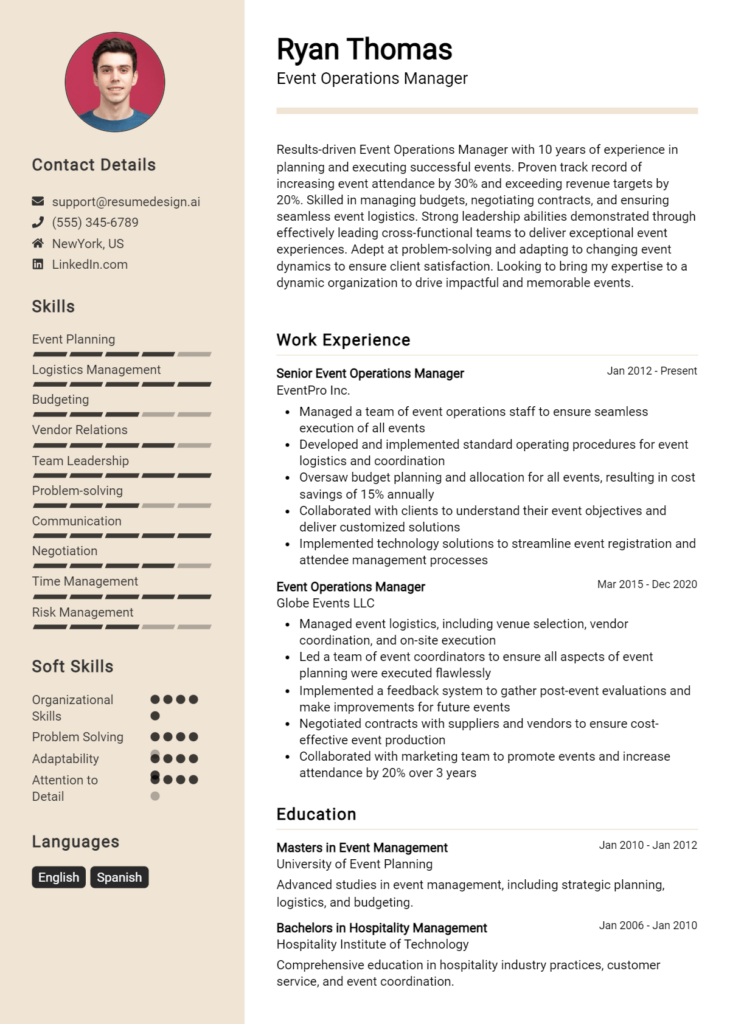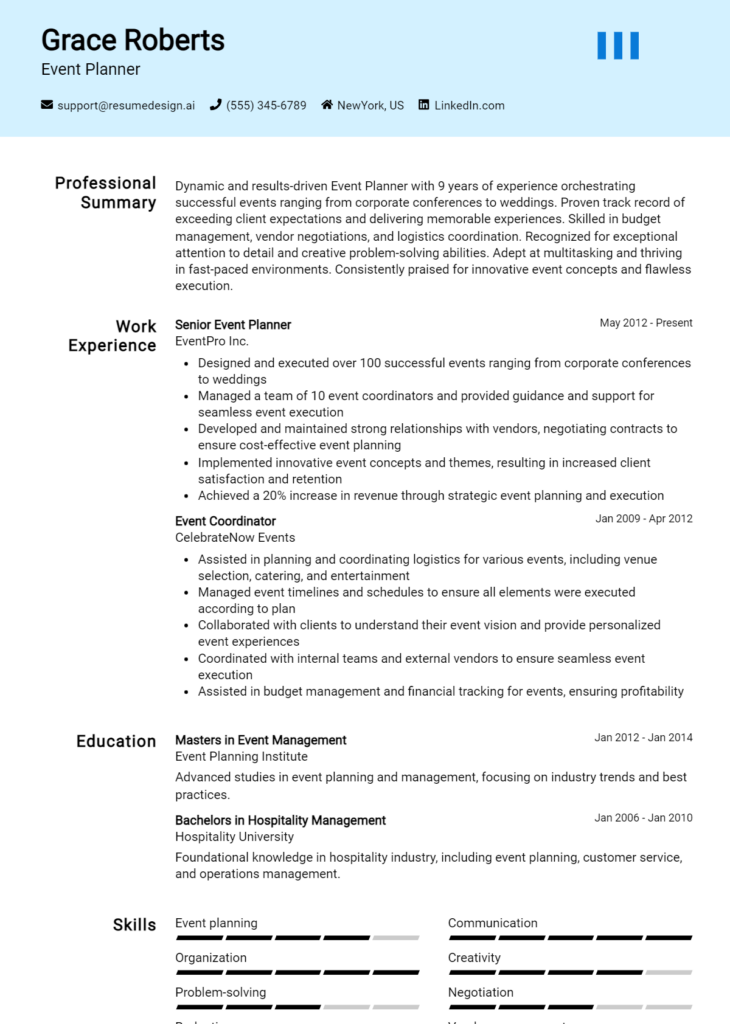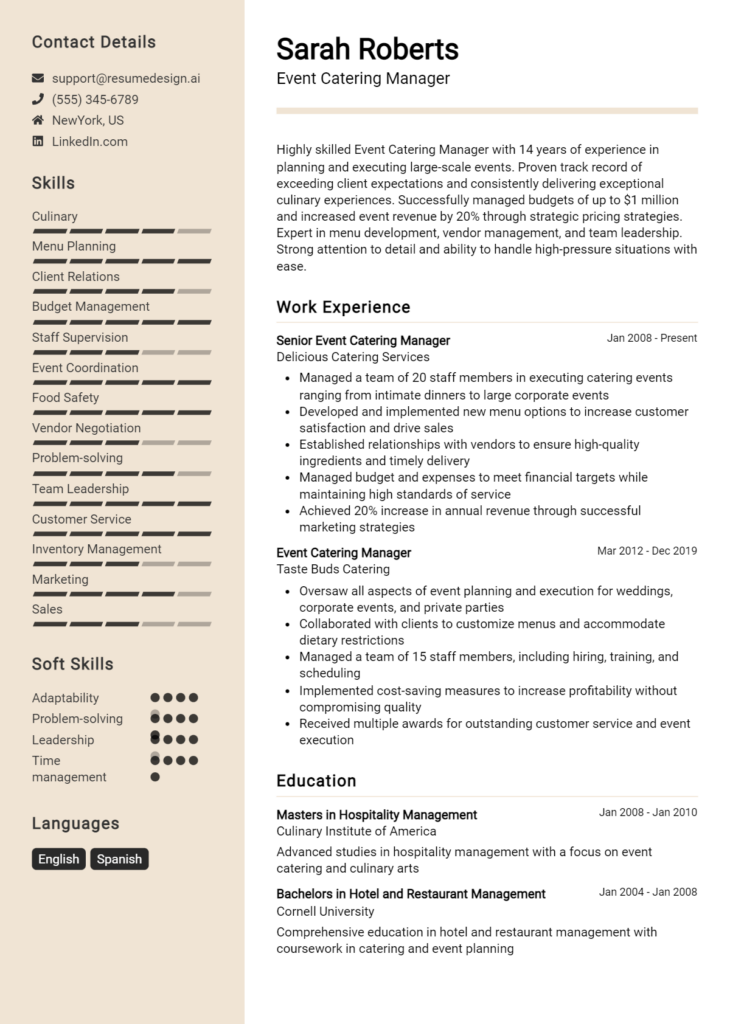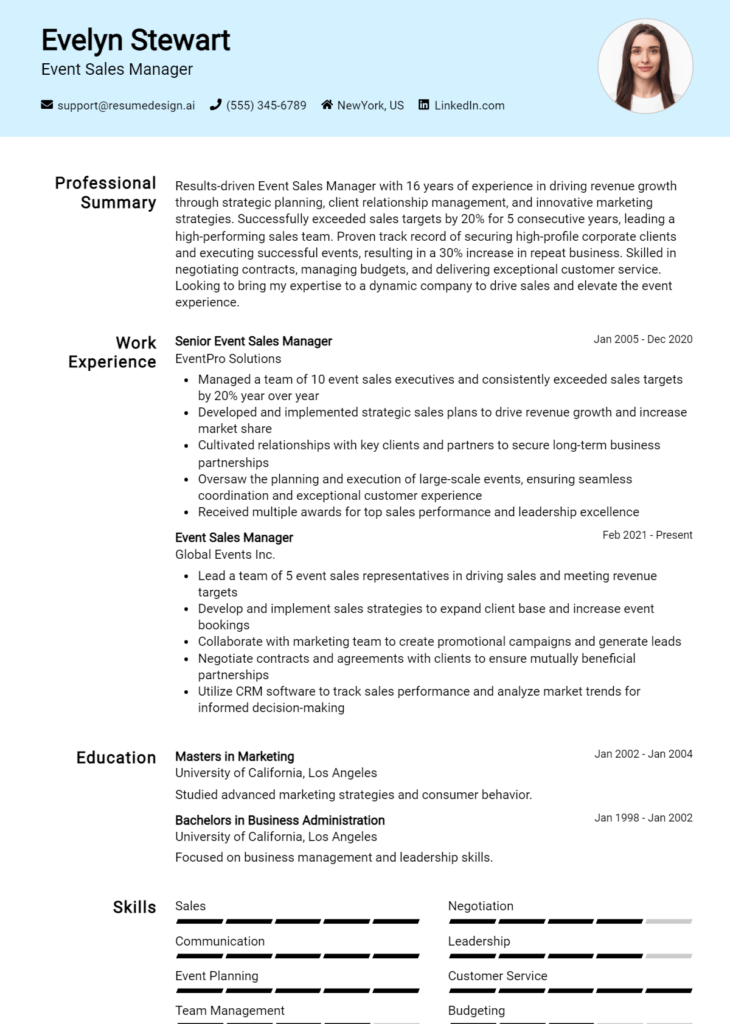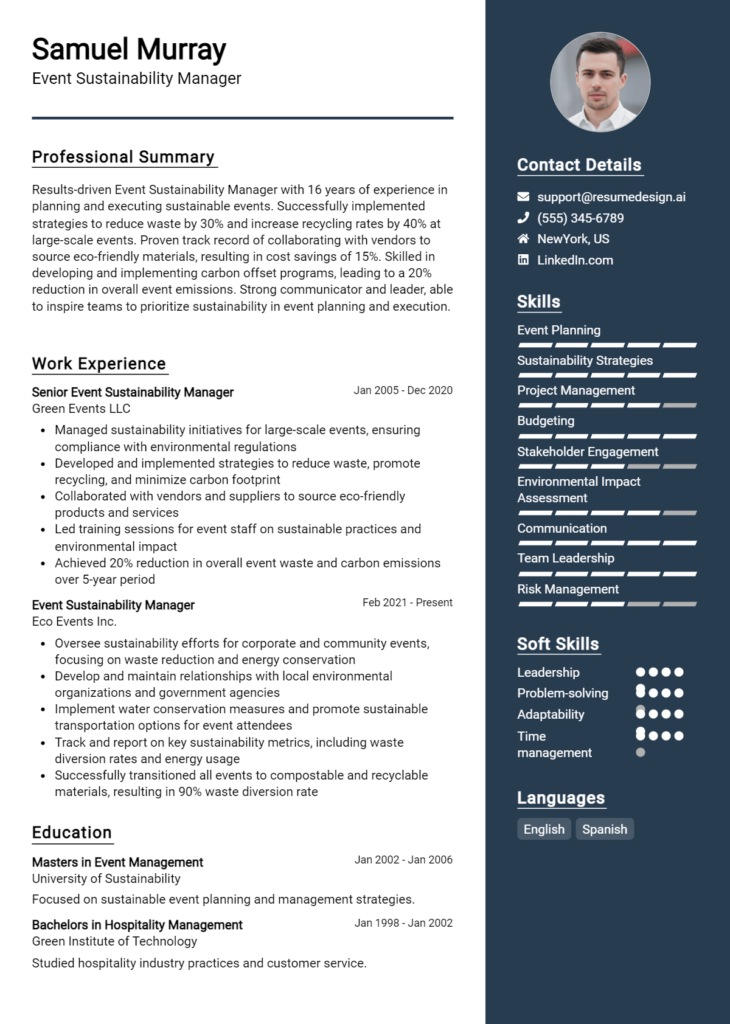Sports Event Manager Core Responsibilities
A Sports Event Manager is essential in orchestrating successful sporting events, requiring a blend of technical, operational, and problem-solving skills. This role bridges various departments, including marketing, finance, and logistics, ensuring seamless collaboration. Key responsibilities include planning, coordinating, and executing events while managing budgets and timelines. Effective communication and leadership are vital for navigating challenges and achieving organizational goals. A well-structured resume that highlights these qualifications can significantly enhance career prospects in this dynamic field.
Common Responsibilities Listed on Sports Event Manager Resume
- Developing and managing event budgets and financial forecasts
- Coordinating logistics, including venue selection and vendor contracts
- Creating marketing strategies to promote events
- Overseeing event setup, including equipment and staff management
- Ensuring compliance with regulatory and safety standards
- Collaborating with sponsors and stakeholders for event success
- Handling on-site management and troubleshooting during events
- Conducting post-event evaluations to assess success and areas for improvement
- Building and maintaining relationships with teams and athletes
- Utilizing technology for event registration and attendee engagement
- Managing volunteer recruitment and training
- Reporting event outcomes and metrics to stakeholders
High-Level Resume Tips for Sports Event Manager Professionals
In the competitive world of sports event management, a well-crafted resume serves as a vital tool for making a strong first impression on potential employers. Your resume is often the first glimpse hiring managers will have of your professional abilities, so it must effectively showcase not only your skills but also your achievements in the field. A standout resume can be the difference between landing an interview and getting overlooked. This guide will provide practical and actionable resume tips specifically tailored for Sports Event Manager professionals, ensuring your resume captures the attention it deserves.
Top Resume Tips for Sports Event Manager Professionals
- Tailor your resume for each job application by aligning your skills and experiences with the specific job description.
- Highlight relevant experience in sports event management, including roles in planning, execution, and post-event analysis.
- Quantify your achievements with specific metrics, such as the number of attendees managed, budget sizes, or revenue generated.
- Include keywords from the job listing to enhance your chances of passing through Applicant Tracking Systems (ATS).
- Showcase industry-specific skills, such as vendor negotiation, team leadership, and risk management.
- Use a clean and professional format, ensuring clarity and easy readability for hiring managers.
- Incorporate a strong summary statement that encapsulates your experience and passion for sports event management.
- List relevant certifications, volunteer work, or professional memberships that enhance your credibility in the industry.
- Keep your resume concise, ideally one page, to maintain the attention of busy hiring managers.
By implementing these tips, you can significantly enhance the effectiveness of your resume, increasing your chances of standing out in the competitive field of sports event management. A polished and targeted resume not only conveys your qualifications but also demonstrates your commitment and professionalism, making a compelling case for why you are the ideal candidate for the job.
Why Resume Headlines & Titles are Important for Sports Event Manager
As a Sports Event Manager, presenting a standout resume is crucial in a competitive job market. One of the most effective ways to capture the attention of hiring managers is through a compelling resume headline or title. This brief yet impactful phrase serves as the first impression, summarizing a candidate’s key qualifications and unique value proposition in a concise manner. A well-crafted headline should be relevant to the position being applied for, highlighting the candidate's strengths and experience, thereby immediately encouraging further exploration of the resume.
Best Practices for Crafting Resume Headlines for Sports Event Manager
- Keep it concise: Limit the headline to one or two impactful sentences.
- Be role-specific: Tailor the headline to reflect the specific role of Sports Event Manager.
- Highlight key achievements: Incorporate notable accomplishments or skills relevant to the job.
- Use action-oriented language: Employ strong verbs that convey dynamism and leadership.
- Incorporate industry keywords: Use terminology that resonates within the sports management field.
- Showcase unique qualifications: Mention any certifications or specialized training that set you apart.
- Avoid clichés: Steer clear of overused phrases that may dilute your message.
- Ensure clarity: Make sure the headline is easily understandable and free of jargon.
Example Resume Headlines for Sports Event Manager
Strong Resume Headlines
“Dynamic Sports Event Manager with 10+ Years of Experience in High-Profile Event Coordination”
“Results-Driven Sports Event Manager Specializing in Strategic Planning and Execution of Major Sporting Events”
“Award-Winning Sports Event Manager with Proven Track Record in Enhancing Fan Engagement and Revenue Generation”
Weak Resume Headlines
“Manager Looking for Work”
“Experienced in Sports”
The strong headlines are effective because they immediately communicate specific expertise, years of experience, and measurable outcomes, making them intriguing and memorable to hiring managers. In contrast, the weak headlines fail to impress due to their lack of specificity and clarity, leaving hiring managers with little information about the candidate's unique qualifications or potential contributions to the role. By avoiding generic titles, candidates can better position themselves as standout applicants in the sports event management field.
Writing an Exceptional Sports Event Manager Resume Summary
A resume summary is a critical component for a Sports Event Manager as it serves as the first impression for hiring managers. A well-crafted summary quickly captures attention by succinctly showcasing key skills, relevant experience, and notable accomplishments that align with the demands of the role. This introductory paragraph should be concise and impactful, tailored specifically to the job the candidate is applying for, allowing them to stand out in a competitive job market.
Best Practices for Writing a Sports Event Manager Resume Summary
- Quantify achievements: Use numbers to showcase the scale of events managed, attendance figures, or budget sizes.
- Focus on relevant skills: Highlight key competencies such as project management, team leadership, and communication.
- Tailor the summary: Customize the summary to reflect the specific job description and requirements of the role being applied for.
- Keep it concise: Aim for 3-5 sentences that deliver maximum impact in a brief format.
- Use strong action verbs: Start sentences with dynamic verbs to convey energy and proactivity.
- Highlight unique accomplishments: Mention any awards, recognitions, or successful projects that set you apart.
- Emphasize industry knowledge: Showcase familiarity with current trends, regulations, and technologies in sports management.
- Maintain professionalism: Use formal language and avoid jargon that might be unclear to hiring managers.
Example Sports Event Manager Resume Summaries
Strong Resume Summaries
Dynamic Sports Event Manager with over 8 years of experience orchestrating high-profile events, including three international marathons, achieving an average 25% increase in participant satisfaction ratings year-over-year.
Results-driven professional skilled in managing budgets exceeding $500,000, leading teams of over 20 staff members, and successfully increasing event revenue by 30% through strategic sponsorship acquisition and marketing initiatives.
Innovative Sports Event Manager with a proven track record of coordinating large-scale tournaments, resulting in record attendance of 10,000+ participants and generating $1M+ in revenue through efficient logistics and stakeholder collaboration.
Weak Resume Summaries
Experienced in planning sports events and working with teams to ensure everything runs smoothly.
Sports Event Manager with a background in organizing events and some experience in the industry.
The examples of strong resume summaries are effective because they provide specific, quantifiable outcomes and directly relate to the skills and expertise required for a Sports Event Manager role. They demonstrate a clear understanding of the position and highlight achievements that can immediately resonate with hiring managers. In contrast, the weak summaries lack specificity and measurable success, making them too generic and less impactful in conveying the candidate's qualifications.
Education and Certifications Section for Sports Event Manager Resume
The education and certifications section in a Sports Event Manager resume is crucial for showcasing a candidate's academic background and demonstrating their commitment to professional growth within the sports industry. This section not only highlights relevant degrees and industry-recognized certifications but also reflects continuous learning efforts that align with the evolving demands of sports event management. By providing pertinent coursework, specialized training, and certifications, candidates can enhance their credibility and better position themselves as qualified contenders for the role, emphasizing their preparedness to tackle the challenges of managing sports events effectively.
Best Practices for Sports Event Manager Education and Certifications
- Focus on relevant degrees such as Sports Management, Event Management, or Business Administration.
- Include industry-recognized certifications like Certified Sports Event Executive (CSEE) or Certified Meeting Professional (CMP).
- Detail relevant coursework that aligns with sports event planning, marketing, and logistics.
- Highlight any specialized training in areas such as risk management, sponsorship acquisition, or venue management.
- Use clear and concise formatting to make it easy for hiring managers to quickly assess qualifications.
- Stay updated with the latest certifications and educational programs to demonstrate a commitment to continuous learning.
- Consider including online courses or workshops that showcase recent trends and skills in sports event management.
- List any notable academic achievements or honors that can set you apart from other candidates.
Example Education and Certifications for Sports Event Manager
Strong Examples
- Bachelor of Science in Sports Management, University of Sports Excellence, 2021
- Certified Sports Event Executive (CSEE), National Association of Sports Event Managers, 2022
- Coursework in Event Marketing and Logistics, University of Sports Excellence
- Certificate in Venue Management, International Venue Managers Association, 2023
Weak Examples
- Bachelor of Arts in History, Generic University, 2019
- Certification in General Business Management, Outdated Institution, 2010
- Coursework in Literature and Composition, Not Relevant to Sports Events
- High School Diploma, Local High School, 2015 (too basic for a managerial role)
The examples listed as strong are considered relevant because they directly pertain to the skills and knowledge required in sports event management, showcasing both educational and professional credentials that enhance the candidate's qualifications. In contrast, the weak examples lack relevance to the sports industry and do not demonstrate the specialized knowledge or skills necessary for a Sports Event Manager, potentially diminishing the candidate's appeal to hiring managers.
Top Skills & Keywords for Sports Event Manager Resume
In the competitive landscape of sports event management, showcasing the right skills on your resume is crucial to stand out to potential employers. A well-crafted resume not only highlights your experience but also emphasizes the specific competencies that make you an effective Sports Event Manager. Employers seek candidates who can manage complex logistics, communicate effectively, and adapt to dynamic environments. By emphasizing both hard and soft skills, you can present yourself as a well-rounded candidate prepared to tackle the challenges of organizing successful sporting events. For a deeper understanding of how to present your skills effectively, explore more about skills and work experience.
Top Hard & Soft Skills for Sports Event Manager
Hard Skills
- Event Planning and Coordination
- Budget Management
- Marketing and Promotion Strategies
- Venue Selection and Management
- Contract Negotiation
- Risk Assessment and Management
- Vendor Management
- Event Technology Utilization
- Data Analysis and Reporting
- Compliance with Regulations and Safety Standards
- Ticketing Systems Management
- Sponsorship Acquisition
- Logistics and Supply Chain Management
- Customer Relationship Management (CRM) Software
Soft Skills
- Strong Communication Skills
- Leadership and Team Management
- Problem-Solving Ability
- Time Management
- Adaptability and Flexibility
- Negotiation Skills
- Attention to Detail
- Creativity and Innovation
- Stress Management
- Customer Service Orientation
- Networking and Relationship Building
- Conflict Resolution
- Decision-Making Skills
- Emotional Intelligence
- Cultural Competence
- Strategic Thinking
- Collaboration and Teamwork
Stand Out with a Winning Sports Event Manager Cover Letter
Dear [Hiring Manager's Name],
I am writing to express my interest in the Sports Event Manager position at [Company Name] as advertised on [where you found the job listing]. With over [X years] of experience in sports management and event planning, I have honed my ability to create engaging and successful sports events that resonate with participants and audiences alike. My passion for sports, combined with a strong background in project management, makes me an ideal candidate for this role.
Throughout my career, I have successfully managed a variety of sporting events, from local tournaments to large-scale competitions. My role at [Previous Company] involved coordinating logistics, overseeing budgets, and collaborating with sponsors and vendors to ensure seamless execution. One notable achievement was the organization of the [specific event], which attracted over [number] attendees and received outstanding feedback for its engaging atmosphere and meticulous planning. My ability to work under pressure and adapt to changing circumstances has been a key factor in my success, as I believe that flexibility is essential in the fast-paced world of sports.
I am particularly drawn to [Company Name] because of its commitment to [specific value or initiative related to the company]. I share this passion and am eager to contribute to your mission by bringing innovative ideas and strategies that enhance the event experience for participants and fans. My proficiency in utilizing data analytics to assess event performance and participant feedback will enable me to make informed decisions that drive future successes.
Thank you for considering my application. I am excited about the opportunity to discuss how my background and skills can contribute to the continued success of [Company Name]. I look forward to the possibility of collaborating with your team to create memorable sporting experiences.
Sincerely,
[Your Name]
[Your Contact Information]
Common Mistakes to Avoid in a Sports Event Manager Resume
When crafting a resume for a Sports Event Manager position, it's crucial to highlight your relevant skills and experiences effectively. However, many candidates make common mistakes that can detract from their overall presentation and impact. Avoiding these pitfalls can significantly enhance your chances of landing an interview and showcasing your qualifications in the best light. Here are some frequent errors to be aware of:
Lack of Tailoring: Submitting a generic resume without customizing it for the specific role can make you seem uninterested. Tailor your resume to align with the job description and highlight relevant experiences.
Overloading with Jargon: While industry-specific terminology can demonstrate knowledge, overusing jargon may confuse hiring managers. Use clear, concise language to articulate your achievements.
Neglecting Quantifiable Achievements: Failing to include measurable results in your previous roles can weaken your impact. Use numbers, percentages, and specific outcomes to illustrate your successes in managing events.
Ignoring Soft Skills: Sports event management requires a blend of hard and soft skills. Omitting important interpersonal skills like communication and teamwork can make your resume less compelling.
Poor Formatting: A cluttered or overly complicated layout can distract from your qualifications. Use a clean, professional format with clear headings and bullet points to enhance readability.
Typos and Grammatical Errors: Submitting a resume riddled with mistakes can signal a lack of attention to detail. Always proofread and consider asking someone else to review your document for errors.
Listing Responsibilities Instead of Achievements: Simply stating your job duties doesn’t showcase your impact. Focus on what you accomplished in each role, highlighting specific projects or initiatives you led.
Failure to Include Relevant Certifications: Not mentioning certifications or training relevant to event management can leave out critical qualifications. Include any relevant courses or certifications that enhance your candidacy.
Conclusion
As a Sports Event Manager, you play a crucial role in orchestrating successful sporting events that engage fans, athletes, and sponsors alike. Throughout this article, we explored the essential skills and responsibilities of this dynamic position, including event planning, logistics coordination, budget management, and stakeholder communication. We also highlighted the importance of adaptability and problem-solving in the fast-paced world of sports management.
In conclusion, if you're looking to enhance your career as a Sports Event Manager, it’s vital to have a strong resume that effectively showcases your qualifications and experience. Take the time to review and update your resume to ensure it reflects your unique skills and accomplishments in the industry.
To assist you in this process, we recommend utilizing the following resources:
- Resume Templates to find a professional layout that suits your style.
- Resume Builder for an easy and guided way to create your resume from scratch.
- Resume Examples to gain inspiration from top-performing resumes in the sports management field.
- Cover Letter Templates to craft a compelling introduction that complements your resume.
Start refining your resume today and position yourself for exciting opportunities in the sports event management arena!

